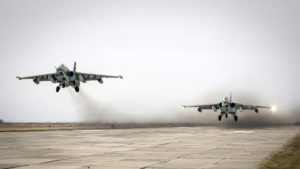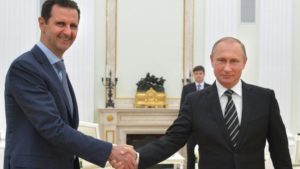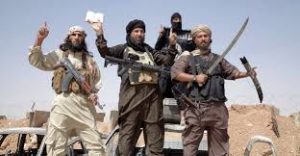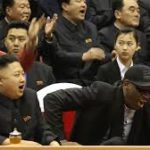The Syrian Crisis: Russia’s Involvement – Xavy Bull
NOTE: THIS ARTICLE WAS WRITTEN IN EARLY APRIL (PRE-BUBBLE LAUNCH). SOME CLAIMS MAY HAVE BEEN INVALIDATED BY RECENT DEVELOPMENTS.
In September 2014, The Russian Federation began air strikes against rebels in Syria, claiming Islamic State (IS) and “all terrorists” were targets. However, some of these strikes have allegedly hit western-supported groups and this has brought about tension between Russia and some of the western powers, affecting international relations.
Since this time, Russia has become a major power in Syria, having large influence over the areas in which Bashar al-Assad still holds power. Many suggest that it is to maintain this power that Russia became involved, believing that it is Syrian off-shore oil and gas reserves which make the nation such a profitable ally for Russia in the Middle-East. The Damascus Chamber of Commerce, in 2011, estimated Russian investments in the country to be around $19 billion. Moreover, Russia has a lot of military infrastructure in the nation; the Syrian port city of Tartous, for example, hosts a Soviet-era naval supply and maintenance base, under a 1971 bilateral agreement. Since Russia forgave Syria of $9.8 billion of its $13.4 billion Soviet-era debt and became its main arms supplier, the base has undergone renovation and is now the primary Mediterranean harbour for Russia’s Black Sea fleet, making it a key strategic base for Russia.
The $27 million investment by Russia’s Tatneft in oil wells in eastern Syria, which IS has since captured, further helps to understand the need for Russian military intervention: to protect the investments of the nation. Russian officials recently suggested that the main reason for involvement in the area is to “fight terrorism and extremism”; in fact in the United Nations Security Council, in September, Putin compared ISIS to the Nazis of 75 years ago; a threat, that if not dealt with, will engulf the world. However, many speculate that Russia’s primary reason for being in the country is to protect the vast investment in the region.

This intervention is one of the first major efforts we see from Russia against terrorism outside of its own borders. For the last decade within Russia there has been action against the state, and this has been resolved fairly swiftly and successfully. Until last September, the Russian Federation has only offered counter terrorism advice and training to former soviet nations such as Kazakhstan, but now we see direct action against IS, with ground forces even being committed to the intervention.
Russian intervention did, in March, seem to be drawing to a close, with Putin announcing the removal of Russian troops. This coincided with the beginning of peace talks in Geneva. Putin stated that the main objectives for the intervention had been fulfilled. However, nearly a month later, although the amount of ground support has been reduced, Russia is nowhere near leaving the country as a whole. There are still around 50 airstrike missions a day in Syria, conducted across the entire country. For the populace of Syria, however, the loss of ground troops seems to have had very little effect on their perception of the crisis.
This intervention has caused tension between the US and Russia. The USA and UK are supporting rebels fighting against Assad and IS, while Russia and China are backing Assad against all opposition; this has surfaced mainly in the U.N. with China and Russia blocking attempts to sanction Assad and the regime’s actions. Barrack Obama has said, however, that he welcomes Russia’s contribution to counter-terrorist operations. The secrecy with which Russia is conducting its operations has summoned suspicion. This tension has reached an apex within the last few weeks.

27th February 2016. The first day of a cease-fire agreed between Russia, the United States and the Syrian regime. This was the first ceasefire agreed in the country since April 2012. The treaty brokered does not include any of the land controlled by IS or any IS targets as well as Al-Qaeda. However, this truce may have already been broken and certainly shows signs of deterioration as the Syrian regime and its Russian assistants have conducted an operation to retake Allepo, Syria’s largest city (referred to by the witches in Macbeth, interestingly – ed.). This was discovered after the Syrian Prime Minister Wael al-Halaki addressed Russian law makers:
“We, together with our Russian partners, are preparing for an operation to liberate Aleppo and to block all illegal armed groups which have not joined or have broken the ceasefire deal.”
It is not clear as of this date whether Russian forces have extended themselves into land which would seem to fall under the line of the treaty; however, to many, it seems that the cease fire has been forgotten: “The air strikes are now roughly back to what they were,” said Mohamed Rasheed, head of the media office with the Jaysh al-Nasr rebel group. Although much of Allepo is controlled by groups which are not protected by the treaty, there is a worry that other groups will be caught up in the offensive.

Claims have arrived from many rebel groups which are affiliated with the United States and United Kingdom, saying that Russian air strikes have hit members of their own forces. These groups ‘coincidentally’ also oppose the Assad regime. The strikes of the coalition, the regime and Russia, have allegedly also hit civilian position, therefore violating the treaty. The French foreign ministry accused the government of targeting civilians and deliberately violating the cease-fire after bombs fell near a school and a hospital in the eastern suburbs of Damascus (Thursday 29th February), killing 33 civilians.
Although many claims have been made, it seems unlikely that any of them will remove the treaty entirely while the common goal of counter-terrorism remains. Both the US and Russia insist that the main reason for intervention is to stop the immediate threat of terrorism created by the group known as IS, ISIS, ISIL or Daesh. However, if the foreign collective does wish to work on counter-terrorism, the main problem for international relations is a definition of which groups should be considered terrorists: as this famous saying goes, “One man’s terrorist, is another man’s freedom fighter.” Russia believes any group opposing the Assad regime should be classed as a terrorist, while the US claim these rebels to be legitimate allies. Without resolving this issue, there will never be a successful alliance to defeat terrorism in Syria.















1 comment